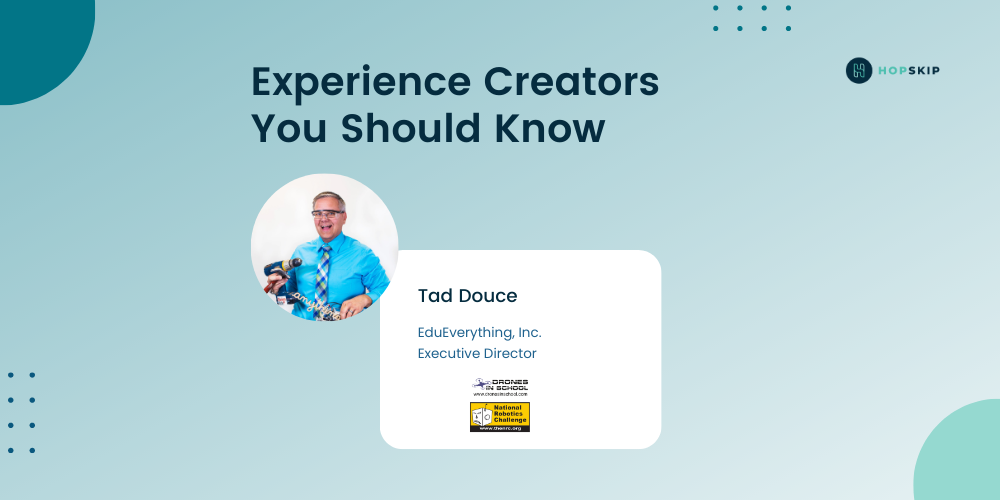Experience Creators You Should Know - Tad Douce, EduEverything, Inc.
Tad Douce, of EduEverything, Inc., discusses how he honed his skills over the pandemic to now be in position to overcome the challenges that the new meetings/events landscape brings.
Luke Whalin
May 16, 2023

This post is part of the HopSkip Planner Spotlight Series where HopSkip spotlights planners across the industry to bring awareness of how they adapted to COVID-19, communicating and lessons learned and sharing how they are viewing the meetings and events industry in a post-pandemic world.
Name: Tad Douce
Company Name: EduEverything, Inc.
Job Title: Executive Director
Years of Experience: 22
How did you get your start in the events industry? What made you pursue this role?
We work in the non-profit space, providing STEM programs for students and educators. As our programs grew, so did the need for culminating experiences. We addressed these needs with summer camps, educator conferences, student competitive events (thenrc.org, dronesinschool.com), and educator workshops.
How would you describe your role or responsibilities as a professional event planner?
As the Executive Director of our small team, I mainly serve as the project manager for our events. This includes everything from venue selection to participant travel and lodging. Organizing educational events that make an impact in the classroom but not on the budget is our specialty.
How do you compare planning your first in-person event post-pandemic, to planning meetings/events pre- Covid? What was different and unique? What was similar?
What challenges have you faced in your work as a meeting and event planner, when working with suppliers or sourcing a venue and how did you overcome them?
Our first post-pandemic event was the National Robotics Challenge in April of 2021. With schools coming in from 13 different states, the clear communication of our safety protocols became a critical challenge. With the variety of opinions on the need for masking, we worked hard to make sure everyone knew the expectations and were respectful of all participants. Before COVID-19, those concerns were not addressed.
As a 501(c)(3) nonprofit, our biggest challenge is finding venues that work within our budget constraints. Our mission is to provide STEM programs for ALL students. To do this, we work hard to keep costs down for participation. When using a traditional conference venue, the cost of chairs, tables, network, etc., all challenge us to maintain that low cost. One way we have worked to overcome those challenges is to purchase many of the decorating and event operation equipment needed. We have created a "drone race" and "combat robot" trailer with everything we need to run an event for these programs. Another thing we have done is partner with other conference events to co-locate our competitions with their existing event. This provides an entertainment factor for exhibitor halls and an opportunity for a tradeshow to showcase their commitment to STEM education initiatives.
How do you determine which vendors are best suited for your stakeholder's needs while also finding those providing competitive services at affordable rates?
Most of what we do is events we are hosting or co-hosting. When it comes to selecting vendors, we typically have a limited pool of possibilities.
Are there any key lessons or insights that have shaped your approach to event planning over the years?
My main advice would be to avoid being afraid to try something new and do not accept it when someone tells you something isn't possible.
Some insight we have had since the pandemic was the possibilities for remote, synchronous, hands-on professional development. Before 2020, we offered six-hour workshops for educators to learn the basics of our Drones in School STEM program. When everything shut down, we realized face-to-face workshops were not an option. We weren't sure what to do, but we knew that doing nothing would mean the end of our program. So, with some testing and improving our use of remote meeting software, we delivered six-hour workshops in two-hour sessions for over 100 educators throughout the US. These online workshops have been so successful that we are continuing with this model for future growth initiatives of the Drones in School program.
I would encourage planners to engage with educational entities as partner. Many educators are looking for experiences to challenge and provide real-world experiences for students. Events can provide great opportunities for collaboration and networking for students. Who knows, you might find your next employee from a student volunteer.